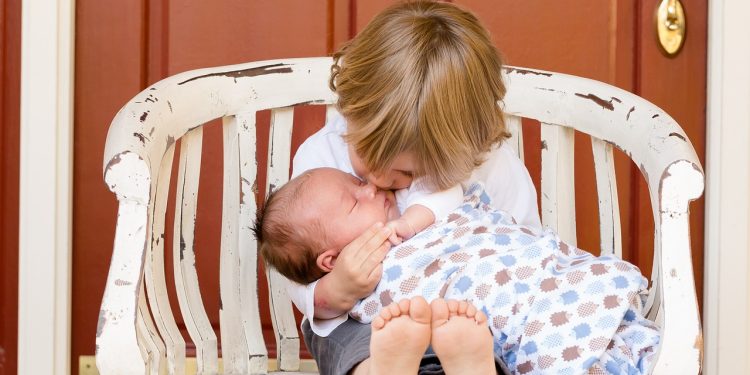The arrival of a new baby is a major life event for the entire family, but it can be especially impactful for older siblings. While bringing a new baby home is filled with joy and excitement, it may also bring a mix of emotions for older children, including confusion, jealousy, or even anxiety about their role in the family. Involving older siblings in caring for the baby can help ease these emotions, making them feel valued and important in this new chapter. It also creates a positive environment where older children learn responsibility and develop a strong bond with their new sibling. This essay explores practical ways to engage older siblings in caring for the new baby, creating a sense of belonging and nurturing healthy relationships.
Understanding Sibling Emotions
For older siblings, the arrival of a baby can feel like a major upheaval. They may suddenly feel that they are no longer the center of attention, which can lead to feelings of jealousy or fear of being replaced. Acknowledging and understanding these emotions is the first step in helping siblings adjust to the new family dynamics. Parents need to be attentive to how their older children are feeling and provide reassurance that their place in the family is secure.
Open communication is key. Encourage older siblings to express their feelings about the new baby, whether they are excited, nervous, or even upset. Letting them know that their feelings are normal and valid helps build trust and reduces any negative emotions that might arise. By actively listening and validating their feelings, parents can create a supportive environment that fosters acceptance of the new sibling.
Assign Age-Appropriate Responsibilities
One of the best ways to involve older siblings in caring for the new baby is by giving them age-appropriate responsibilities. Assigning tasks that match their age and abilities helps them feel involved and proud of their role. Younger siblings might enjoy simple tasks like fetching diapers, picking out the baby’s clothes, or singing lullabies. Older children can assist with more involved activities, such as helping during bath time, reading stories to the baby, or even helping to prepare bottles.
It’s important to frame these responsibilities as special jobs that only they can do. This makes the older sibling feel needed and appreciated, rather than burdened. When they complete a task, praise their efforts and highlight how much they are helping both the baby and the parents. Positive reinforcement goes a long way in building a sense of accomplishment and pride.
Creating Special One-on-One Time
While involving older siblings in caring for the baby is important, it’s equally essential to ensure they still receive individual attention. The arrival of a newborn often shifts the parents’ focus, which can make older children feel left out. Setting aside special one-on-one time with each older sibling helps them feel seen and valued. Whether it’s a trip to the park, a movie night at home, or simply reading a book together, these moments of focused attention help maintain the bond between parents and older children.
By balancing caregiving duties with dedicated one-on-one time, parents can create a sense of stability for older siblings. It reassures them that they are not being replaced and that their parents’ love for them remains unchanged. This stability is key to helping older children feel secure and comfortable in their new role as a big brother or sister.
Making Siblings Feel Like a Team
Framing the care of the new baby as a family team effort can help older siblings feel a sense of camaraderie and belonging. Emphasize that everyone has a role to play in taking care of the new baby, and that being an older sibling is a special job that comes with unique privileges. Using language like “We’re all in this together” or “You’re the best big brother/sister this baby could have” fosters a sense of teamwork and mutual support.
Parents can create small rituals that involve the entire family, such as singing lullabies together before bedtime or having a “family cuddle time” with the new baby. These activities not only strengthen the bond between siblings but also reinforce the idea that they are part of a loving and supportive unit where everyone contributes.
Encouraging Gentle Interaction
Many older siblings are eager to interact with the new baby, but they may need guidance on how to do so safely and gently. Teaching older children how to hold the baby properly, how to be gentle while touching, and how to recognize when the baby needs space can help prevent accidents and foster positive interactions. Parents should model these behaviors and offer gentle reminders as needed.
Encouraging older siblings to talk or sing to the baby, stroke their hands, or show them toys are great ways to build a bond while keeping interactions safe. These gentle interactions help the older sibling feel connected to the baby while also reinforcing the importance of being careful and caring.
Acknowledging and Celebrating the Role of Older Siblings
It’s important to celebrate the contributions that older siblings make in caring for the new baby. Acknowledgment can come in many forms—verbal praise, small rewards, or even creating a “Big Sibling Certificate” to honor their efforts. Celebrating their role helps older siblings feel proud of their contributions and strengthens their bond with the new baby.
In addition to praise from parents, encouraging extended family members to acknowledge the older sibling’s role can also be impactful. Simple comments like, “You’re doing such a great job helping with the baby!” from grandparents, aunts, or uncles can boost the older sibling’s confidence and make them feel more involved in the family’s journey.
Addressing Challenges and Providing Reassurance
Even with the best efforts to involve older siblings, there will be moments when they feel frustrated or act out due to the changes at home. It’s essential for parents to be patient and understanding during these times. Rather than reacting with anger, take a moment to empathize and provide reassurance. Let them know that it’s okay to feel upset and that their feelings matter.
If an older sibling is struggling, finding ways to redirect their emotions positively can help. For instance, if they are feeling jealous of the attention the baby is getting, parents could involve them in activities that only “big kids” get to do, highlighting their unique and special role. Reinforcing the idea that they are important and loved is crucial in helping older siblings adjust to the new family dynamic.
The Long-Term Benefits of Involving Older Siblings
Involving older siblings in caring for the new baby has benefits that go far beyond the early weeks and months. It helps cultivate a sense of empathy, responsibility, and teamwork that will serve them throughout their lives. Siblings who are encouraged to be actively involved in each other’s lives often develop deeper bonds that last into adulthood.
Older siblings who take on caregiving roles also learn important life skills, such as patience, nurturing, and communication. These qualities are not only beneficial within the family but are also valuable in friendships and social interactions outside the home. By fostering a positive relationship between siblings from the very beginning, parents are laying the foundation for a lifelong friendship built on love, trust, and mutual respect.












